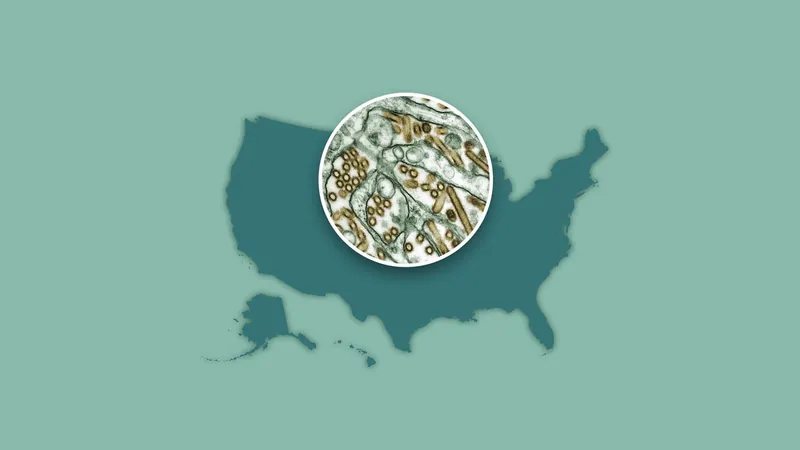
Alarming Rise in Bird Flu Cases: States Affected and What You Need to Know
2024-12-21
Author: Jessica Wong
In a shocking development, Louisiana has reported the first serious human case of avian influenza, commonly known as bird flu, marking a significant health concern for the nation. The Centers for Disease Control and Prevention (CDC) has confirmed that a person in Louisiana was hospitalized after likely coming into contact with the H5N1 virus from sick or deceased birds in a backyard flock. This incident stands out as the first case in the United States directly linked to a backyard setting.
Since April 2024, a total of 61 human cases of bird flu have been recorded across the country, with the virus primarily transmitted from animals to humans. The CDC’s assessment indicates a low risk to public health for now; however, the level of concern would drastically elevate if the virus were to start spreading from one person to another.
Where is Bird Flu Making Headlines?
The avian influenza outbreak has been detected in eight states this year, with Wisconsin reporting an individual who may have contracted the virus after contact with sick animals at a commercial poultry facility. While this case awaits confirmation from the CDC, it adds to the urgency of monitoring the virus's spread.
California is currently in a state of emergency due to alarming rates of bird flu infection, affecting both commercial poultry and backyard flocks within the state. The disease is not only infecting birds but has also seen multiple human cases emerge, further raising concerns among health officials.
The Scale of the Outbreak
According to the CDC, since 2021, over 125 million birds across 569 counties and all 50 states have been reported infected with the bird flu. This widespread outbreak necessitates vigilance, especially among individuals who may have close interactions with birds, such as backyard flock owners, hunters, and bird watchers.
Recognizing Bird Flu Symptoms in Humans
Though rare, bird flu can infect humans, typically through direct contact with the virus found in birds. Symptoms can appear mildly or severely:
- **Mild Symptoms:** Fever, cough, sore throat, body aches, conjunctivitis (pink eye), runny or stuffy nose, fatigue, and muscle aches.
- **Severe Symptoms:** High fever (100°F or higher), pneumonia requiring hospitalization, shortness of breath, and severe respiratory distress.
Given the potential risks associated with bird flu and the current outbreak, health officials urge those in contact with birds or bird droppings to take necessary precautions. Regular hand washing, wearing protective gear, and avoiding close contact with sick animals are critical measures to reduce the risk of transmission.
As this story develops, it remains crucial for the public to stay informed and proactive about their health, especially as bird flu cases continue to rise in various states.



 Brasil (PT)
Brasil (PT)
 Canada (EN)
Canada (EN)
 Chile (ES)
Chile (ES)
 España (ES)
España (ES)
 France (FR)
France (FR)
 Hong Kong (EN)
Hong Kong (EN)
 Italia (IT)
Italia (IT)
 日本 (JA)
日本 (JA)
 Magyarország (HU)
Magyarország (HU)
 Norge (NO)
Norge (NO)
 Polska (PL)
Polska (PL)
 Schweiz (DE)
Schweiz (DE)
 Singapore (EN)
Singapore (EN)
 Sverige (SV)
Sverige (SV)
 Suomi (FI)
Suomi (FI)
 Türkiye (TR)
Türkiye (TR)